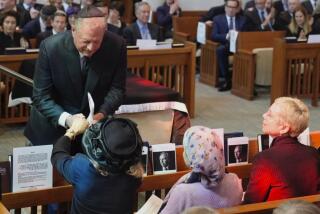Lieberman Joins Race, Faults Bush
- Share via
WASHINGTON — WASHINGTON -- Sen. Joseph I. Lieberman (D-Conn.), presenting himself as “a different kind of Democrat,” declared his candidacy for his party’s 2004 presidential nomination Monday with a sweeping indictment of President Bush’s record at home and abroad.
“Two years ago, we were promised a better America,” Lieberman told an audience at his old high school in Stamford, Conn. “But that promise has not been kept.”
In a brief speech that mixed sharp challenges to Bush with promises of bipartisanship, Lieberman -- the party’s 2000 vice presidential nominee -- reprised themes and phrases associated with former President Clinton. From his “different kind of Democrat” pledge to his embrace of families who “work hard and play by the rules,” Lieberman echoed Clinton’s 1992 campaign language and promised to advance centrist views on issues from education to foreign policy.
Indeed, Lieberman immediately focused on ideas guaranteed to provoke conflict with key Democratic constituencies -- endorsing Bush’s push toward war in Iraq, reaffirming his support for limited experiments with private school vouchers and renewing his criticism of the entertainment industry “for peddling sex and violence to our children.”
By unequivocally announcing his candidacy, Lieberman went a slight step further than three likely Democratic rivals: Sens. John F. Kerry of Massachusetts and John Edwards of North Carolina and former House Minority Leader Richard A. Gephardt of Missouri, who have all established committees to explore the race and are expected to run.
Former Vermont Gov. Howard Dean has also declared his candidacy, and civil rights activist Al Sharpton has indicated he will soon open an exploratory committee.
Former Colorado Sen. Gary Hart, who sought the nomination in 1984 and 1988, has suggested he’s likely to join the field, and Sen. Bob Graham (D-Fla.) and retired Gen. Wesley Clark are considering candidacies.
If elected, Lieberman would become the first Jewish president. He first won a U.S. Senate seat in 1988 after stints as a state senator and Connecticut’s attorney general. Ordinarily a Clinton ally, Lieberman drew enormous attention for a Senate speech in August 1998 that condemned Clinton’s affair with Monica S. Lewinsky. After Clinton was impeached on charges stemming from the affair, Lieberman voted against removing him from office.
The moral denunciation of Clinton -- combined with support for most of the administration’s policies -- helped prompt Al Gore, the 2000 Democratic presidential nominee, to tap Lieberman as his running mate. That made Lieberman the first Jewish vice presidential nominee on a major party ticket.
After the election, Lieberman said he would not run for the top spot in 2004 if Gore did. But his path into the race was cleared when the former vice president announced in December that he had decided not to run.
At a news conference Monday in his old school, Lieberman expressed confidence that his Jewish faith would not be an issue.
“I begin this campaign ... with the confidence, frankly, that the American people are too smart and too aware of how tough the times are to judge a candidate for president on anything other than his or her record, ability and ideas and values for America’s future,” he said.
Polls in 2000 found that only a tiny minority of Americans said Lieberman’s religion would affect their opinion of him. In a Gallup survey that year, 88% of Americans said Lieberman’s religion had no effect on their view of him; just 4% said it made them less favorable toward him.
Intriguingly, though, 14% of those polled said Lieberman’s religion might make people who live near them less favorable -- a finding that suggests some of those reluctant to vote for a Jewish candidate did not want to openly admit it. Also, several University of Florida political scientists Monday released polling results from 2002 that found 11% of the state’s voters resistant to a Jewish presidential candidate.
“No one should assume that because Joe Lieberman did not encounter a lot of problems when he ran for vice president in 2000 that this would be the case if he ran ... at the top of the ticket,” said Kenneth Wald, a University of Florida political scientist.
In the current crowded contest, Lieberman, 60, would start with some significant assets.
With the exposure he gained in 2000, Lieberman leads in most national polls measuring early sentiment among Democratic primary voters for 2004. And he is considered among the most formidable fund-raisers in the emerging Democratic field, because of the contacts he developed in 2000 and his ties to the nationwide Jewish community.
As a former chairman of the Democratic Leadership Council -- the centrist group that helped launch Clinton’s national career -- he’s also a favorite of many Democratic moderates. On policy, Lieberman largely follows the “New Democrat” agenda that Clinton and Gore advanced -- though on some issues, such as his openness to experiments with school vouchers, Lieberman comes out to their right.
Lieberman’s receptivity to non-traditional Democratic ideas has led him to work with Bush on education reform and legislation to make it easier for religiously based charities to provide government services. But he’s also condemned Bush’s economic record and environmental policy, and he denounced the president’s 2001 tax cut and the new reductions Bush proposed last week as fiscally irresponsible.
“Too many of the president’s policies are either driven by extreme ideologues in the administration or major financial interests,” Lieberman charged Monday.
White House Press Secretary Ari Fleischer brushed aside the criticism, telling reporters: “The Democrats have a lot to sort through before it even gets to an issue that involves the president.”
Supporters believe Lieberman, arguably the most hawkish Democratic presidential contender since the late Sen. Henry M. “Scoop” Jackson (D-Wash.) in 1976, is better positioned than any of his rivals to establish credibility with voters as a potential commander-in-chief and critique Bush’s record on national security.
In his remarks Monday, Lieberman praised Bush’s handling of the confrontation with Iraqi President Saddam Hussein and pledged an aggressive fight against terrorism. “We must never shrink from using American power to defend our ideals against evil in a time of war,” he said. “And we must never forget to use the power of our ideals as a force for good in the quest for peace.”
But Lieberman also condemned Bush’s approach to North Korea as inconsistent and said the administration has been too slow in strengthening America’s domestic defenses against terrorism.
Lieberman was a principal congressional proponent of creating the new Department of Homeland Security, an idea the Bush administration initially resisted.
These eclectic views, though, could present obstacles for Lieberman in a Democratic primary. By embracing so many ideas that depart from Democratic orthodoxy, Lieberman has guaranteed a skeptical response from several key party constituencies.
“He has huge liabilities on almost every policy area,” said Robert Borosage, co-director of the Campaign for America’s Future, a liberal advocacy group. “It’s a more liberal party than he is.”
At various points, Lieberman has angered civil libertarians over his work with Bush on religious charities, organized labor through his support for free trade, consumer groups by opposing an effort to require companies to account for the cost of stock options, Hollywood with his endorsement of federal efforts to crack down on the marketing of violent or sexually explicit entertainment to young people and teachers by backing experiments with school vouchers for low-income students.
In response to a question Monday, Lieberman said he continued to support such experiments so long as the vouchers were provided only to students below the poverty line and were not funded by diverting existing funds allocated to the public schools.
*
Times staff writer John-Thor Dahlburg in Miami contributed to this report.
More to Read
Get the L.A. Times Politics newsletter
Deeply reported insights into legislation, politics and policy from Sacramento, Washington and beyond. In your inbox twice per week.
You may occasionally receive promotional content from the Los Angeles Times.










